
'Pat Garrett and Billy the Kid' opens in Las Cruces, New Mexico, 1909 as ageing Sheriff Pat Garrett (James Coburn) is in dispute with landowner John Poe (John Beck) over a lease agreement. Garrett and Beck's association goes back to 1881 when Garrett tracked down his former friend and partner in crime Billy the Kid (Kris Kristofferson), but they've come to a parting of the ways. With Garrett old and embittered and publically critical of the Santa Fe Ring, Beck and his business partners consider him a liability - an embarrassing throwback to the old days - and are planning to assassinate him. In his last few moments alive, Garrett relives those infamous days and the terrible denouement that made him a sheriff and the Kid a legend.
It’s a simple story in the way that ‘The Wild Bunch’ is simple, ie. narratively (Peckinpah collaborator Gordon Carroll summarised the plot as "a man who doesn't want to run ... pursued by a man who doesn't want to catch him"); thematically, it’s dense and complicated.There's probably an entire article that can be written about the opening credits sequence. Events in Las Cruces, 1909 (Poe's betrayal of Garrett) and Fort Sumner, 1881 (Garrett's reunion with the Kid a week before he takes the post of sheriff, ie. just prior to his betrayal of Billy) are intercut. When Garrett rides into Fort Sumner, he finds the Kid and his minions amusing themselves shooting the heads off a bunch of chickens buried up to their necks in the dirt. At Las Cruces, Poe's henchman mumbles something about checking a harness, instead pulling a rifle from a saddle roll; another gunman crawls through the sagebrush, ready to take up his position. The shots that follow cut between target practice and cold-blooded murder. Billy's men blast the heads of chickens; Poe's open fire on Garrett. Timeframes overlap. So does the soundtrack. "Damn near perfect," one of Billy's acolytes declares, apropos of a summarily despatched chicken ... but the words echo as Garrett takes a shot and slumps to the ground. Peckinpah's use of editing ramps up the emotional impact of the sequence: a potshot Billy takes at a chicken seems to travel through time and strike Garrett; purposefully aimed coups de grace by Poe's men result in the heads being blasted off helpless fowl.
Peckinpah's signature freeze frames are used as bluntly and brilliant as in 'The Wild Bunch'. As Garrett struggles to rise from the dusty ground only to sink back defeatedly, Peckinpah isolates the moment. He uses this image to accompany the film's title. He arrives at his "directed by" credit in equally iconoclastic fashion. The 1909 prologue documenting Garrett's death throes gives out the 1881 Fort Sumner sequence, and a very much alive - and younger (though still notably middle-aged) Garrett comes riding into town. Billy the gang don't notice him, so busy are they decimating the local feathered populace. Hopping off his horse, he hefts his rifle and, while Billy's still aiming, sights on a chicken and blows its head off. Billy's boys go diving for cover, panic written on their faces. Billy turns round, slowly and wryly, and greets his old friend with a grin. Some spiky banter ensues (it's clear some of the Kid's hangers-on aren't too happy to see Garrett), then the two of them head off to the bar for a couple of shots of whisky and the business at hand:
Garrett: Times are changin', Billy. You want it straight?
Billy: If that's what you're here for.
Garrett: The electorate want you gone. Out of the country.
Billy: Well, are they tellin' me or are they askin' me?.
Garrett: I'm askin' you. But in five days I'm makin' you, when I take over as sheriff of the county.
Peckinpah's directed by credit appears at this point, in a freeze frame that enforces the pause between "I'm makin' you" and "when I take over as sheriff". It might not be as quotable as "if they move, kill 'em" in 'The Wild Bunch', but by God it gives the line some weight!
Billy: If that's what you're here for.
Garrett: The electorate want you gone. Out of the country.
Billy: Well, are they tellin' me or are they askin' me?.
Garrett: I'm askin' you. But in five days I'm makin' you, when I take over as sheriff of the county.
The dynamic has thus been established: Garrett and the Kid are equally protagonist and antagonist. Neither are exactly heroes, though Peckinpah both empathisizes with the weight of world-weary experience that seems to be etched into every line on Garrett's face, and appreciates the self-aggrandizing behaviour of Billy (particularly in his escape from the Lincoln County jail). Neither are entirely villains, either, even though Billy is a notorious outlaw who refuses to change his ways, and Garrett is a former outlaw who commits the greater sin (certainly in the grand scheme of Peckinpah's aesthetics) of not remaining true to himself and trying to change with the times.

Oh yes, Garrett is the first (and last) of Peckinpah's western protagonists to break with the tradition of Steve Judd, Pike Bishop and co. and Cable Hogue. This is perhaps the most significant element of the dynamic/antagonism between Garrett and Billy - it's summed up during their conversation just after the opening credits:
Billy: Sheriff Pat Garrett. Sold out to the Santa Fe Ring. How does it feel.
Garrett: It feels like times have changed.
Billy: Times maybe, but not me.
Garrett: It feels like times have changed.
Billy: Times maybe, but not me.
Which makes it pretty clear that, since neither Garrett or the Kid are entirely good guy or bad guy, the real villain of the piece is the changing times. Or rather the men who are responsible for changing them. The men responsible for political corruption, financial chicanery, corporate conspiracy and the fencing off of frontier territory, the free and open spaces partitioned, owned, leased and jealously guarded. Men like high-living politico Governor Wallace (Jason Robards), eminence grices Holland and Norris (the power behind Wallace's throne), grasping landowner John Chisum (Barry Sullivan) and toadying parvenu on the make Poe. If 'The Wild Bunch' and 'The Ballad of Cable Hogue'depict technology as the instrument of change, then 'Pat Garrett and Billy the Kid' looks back to 'Ride the High Country' ("the days of the forty-niners are past and the days of the steady businessman have arrived") - only here the steady businessman has been replaced by the rapacious businessman, the dollar-obsessed businessman, the businessman who rapes the land and values human life lower than his profit margin. Corruption and bribery are rife. At an interview with Wallace, the Governor offers Garrett an incentive towards Billy's expedited apprehension:
Wallace: We're offering a reward of one thousand dollars for the Kid's capture. You can have five hundred now.
Garrett: Well, I aim to bring the Kid in. But until I do, you'd better take your five hundred dollars and shove it up your ass and set fire to it.
One of the most curious aspects of 'Pat Garrett and Billy the Kid' - and I'm damned if I can work out whether it's a flaw or a masterstroke - is how determinedly Peckinpah keeps the Chisum/Wallace/Poe conspiracy offscreen. True, all three of them get at least one significant scene (Garrett's encounter with Wallace is thorny; with Chisum, cautious), but they remain backgrounded, shadows that creep around the edges of Garrett's pursuit of Billy. The depiction of Chisum in particular is borderline bland. It's as if Peckinpah is saying "yup, these are the villains, these are the guys hellbent on destroying the old ways, these are guys without souls who answer only to money and power and influence, but by Christ they're nobodies - they ain't really men".Wallace: We're offering a reward of one thousand dollars for the Kid's capture. You can have five hundred now.
Garrett: Well, I aim to bring the Kid in. But until I do, you'd better take your five hundred dollars and shove it up your ass and set fire to it.
Peckinpah has more time for Deputies Bell (Matt Clark) and Ollinger (R.G. Armstrong), the latter completing the triumvirate of fanatical religious types the actor specialised in (following on from Knudsen in 'Ride the High Country' and Dahlstrom in 'Major Dundee'. Both are in the way when Billy liberates himself from Lincoln Country jail. Kristofferson's characterisation of Billy melds ruefulness and cold determination when he comes up against Bell. It's a different story with Ollinger. The two men have already entered into a spirited disagreement over spiritual matters, Ollinger committed to making sure Billy "gets with god" ("I'll take you for a walk across Hell on a spiderweb") and Billy responding to Ollinger's pious "On your knees" with a pithy "Kiss my ass". Billy's summary dispatching of Ollinger burns with the visceral and iconic intensity that fuelled Peckinpah's reputation as "Bloody Sam".
Peckinpah has more time for Sheriff Baker (Slim Pickens) and Black Harris (L.Q. Jones), whose exchange of fire after Garrett co-opts the former to help in smoking out the latter results in Baker's agonisingly slow passing, stumbling down to the river, gut-shot, and sitting by the slowly flowing waters, the silvery play of light on the surface, as his breathing grows shallower and the life ebbs out of him. At the same time terrible and utterly beautiful, it's one of the greatest scenes Peckinpah ever shot. Likewise the narratively pointless but poetically eloquent scene where Garrett, in a playful throwback to the outshooting-Billy-at-Fort-Sumner scene, accidentally provokes an exchange of fire with a passing raftsman, only for both men to pause, reflect and lower their guns at the critical moment. Both of these scenes are redolent of Peckinpah the humanitarian, Peckinpah the poet, Peckinpah the wounded romantic, desperately aching for a time that's changed and bitterly regretful of the forces that changed it. They give the lie to the cliche of Peckinpah as a purveyor of violence for its own sake.




'Pat Garrett and Billy the Kid' - given its troubled production, its director's tendency to drinking to insensation on set, the disservices done to it in editing, and its rejection of propulsive/exciting/urgent pacing typical of a chase narrative - ought to be a complete mess. And certainly there's a wonky, woozy, slightly off-kilter feel to the film. Watching it is like being punch-drunk. But it's also multi-layered, a film that repays repeated viewings. A film that worms its way under your skin and disseminates its genius slowly and subconsciously.
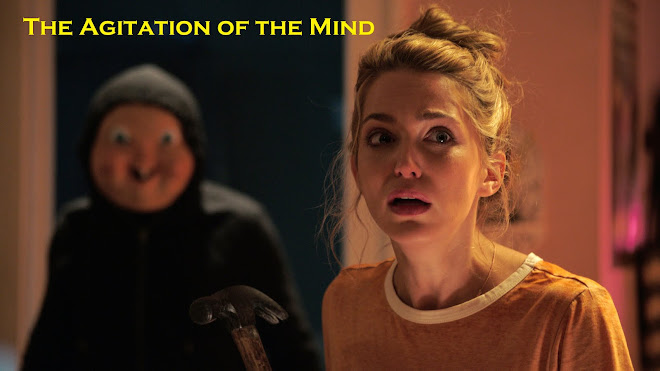
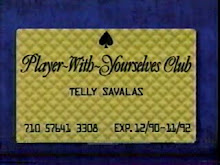
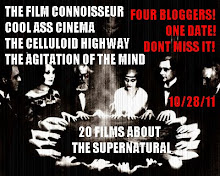
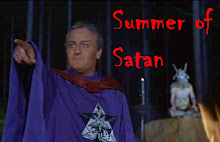
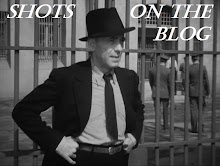

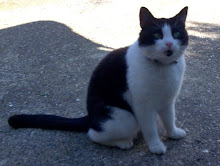









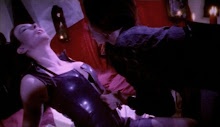





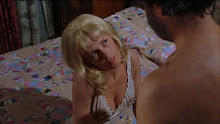
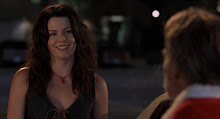








No comments:
Post a Comment